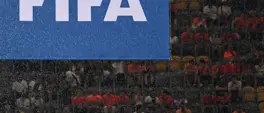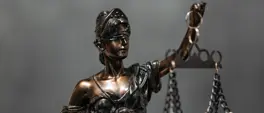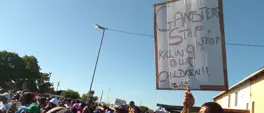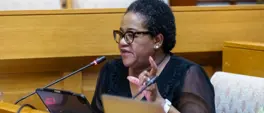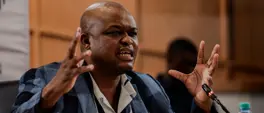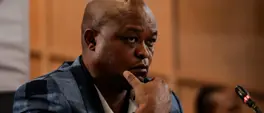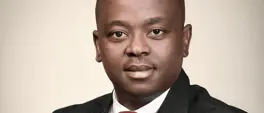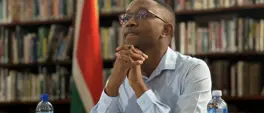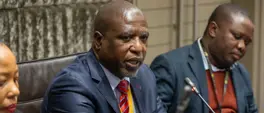Steenhuisen: The right decision, but not a GNU at all costs
Lindsay Dentlinger
10 February 2025 | 4:59In a wide-ranging interview with EWN, DA leader John Steenhuisen talks about the GNU, being in government, land and the pressures of leadership.
CAPE TOWN - Whether it will be the hallmark of his leadership, or spell the end after two three-year terms, John Steenhuisen believes the Democratic Alliance (DA) has done the right thing to enter the Government of National Unity.
Seven months in, there’s been a fair amount of criticism within and outside of the party about how the DA manages itself within the coalition of ten parties.
After years of being a government-in-waiting, Steenhuisen is candid about his experience so far, saying it’s a lot harder on the inside, than it appeared on the outside, looking in.
"It’s like trying to drink water from a fire hydrant," he told EWN.
"It’s relatively easy to be in opposition. You simply come with ideas, you make a speech, you try to get those ideas across. In government, you have to now implement and actually deliver on many of these things."
As the agriculture minister with five other ministers in various portfolios, and another six deputy ministers, Steenhuisen’s job has increased threefold - balancing party, parliamentary and Cabinet responsibilities.
"As dysfunctional and slow as government has looked to you on the outside, when you get into the belly of the beast it’s certainly a lot worse than you thought in the beginning. There’s a lot of red tape and we have to move, to be more efficient in ways of doing government."
SETTLING IN
Steenhuisen’s appointment as agriculture minister got off to a rough start, overshadowed by the unqualified appointments he initially made to his political office, several of which were rejected by the administration.
The most controversial appointment, however, and a hangover that continues to linger, is his chief of staff, Roman Cabanac, a provocative political
commentator and podcaster, known to have made racist comments, often against the DA itself.
"I’m happy to say I made a mistake on that one. It’s a mistake I won’t repeat, and I got it right on the other appointments," said Steenhuisen. "A lot was made about that appointment. But you also have to look at the context in which it was made. Coming straight from a punishing election campaign, then negotiations, and having to staff offices at short notice, without giving it much thought that you would actually be in government after election."
Not yet completely resolved, Steenhuisen says there are indications that the human resource process is in its final stages, which will allow him to make a new appointment in that position.
Now surrounded by a solid team both in his private office, and in government, Steenhuisen said he’s committed to helping farmers on both ends of the spectrum. He believes South Africa’s products are world-class, and he’s committed to increasing the participation of small, black farmers in the value chain.
In the past week, South Africa has regained market access for the exportation of fresh apples to Thailand, a market that had been closed for 16 years due to changes in requirements by the trading partner.
And while the DA as a party has often been critical of South Africa’s relationship with China, Steenhuisen said he’s putting ideological differences aside to maximise trade opportunities. He was part of government’s delegation to the Forum on Africa-China Cooperation (FOCAC) last year.
"Do we agree with everything their government does? Do they agree with everything our government does? Do I agree with everything the Americans do? Absolutely not. But the whole point about trade is that you’ve got to find each other, and we all need each other in an interconnected world."
Separating the land portfolio from that of agriculture, Steenhuisen believes, was the right thing to do, saying that over the last five to ten years, much of the focus has been on the land debate and not enough on agricultural production and marketing of goods.
While still in process, and dependent on budget, the departments will officially separate on 1 April, when the new financial year kicks in.
"Farmer support is required. I’ve got small-scale farmers and farmers who are looking for land, so we have to have interaction. So Minister [Mzwanele] Nyhontso and I are going to be working very closely together, even when the departments separate because there’s an intrinsic link there," he said.
EXPROPRIATION DOUBLE SPEAK?
Over the past two weeks, the DA has come in for flak over what’s perceived to be double speak on expropriation - on the one hand threatening court action over the enactment of the Expropriation Act, but on the other, slamming the misinformation being peddled about expropriation which has led the United States to issue executive orders against South Africa, withdrawing health aid, and which in future could also threaten preferential agricultural trade when the Africa Growth and Opportunity Act is considered for renewal in September.
But Steenhuisen said there’s no ambiguity in the party’s position.
"There’s no mass expropriation happening in South Africa, no one is being targeted in South Africa in any specific way, but that doesn’t derogate from the fact that we have a piece of legislation which is flawed. We believe those issues make it unconstitutional, and we are left with no option as a party but to go to court in an effort to get it sent back to Parliament to have it repaired."
Steenhuisen said it was his party’s duty to correct misinformation when it’s not based on fact.
On Friday, the United States offered refugee status to Afrikaners who claim they are victims of racial discrimination.
A GNU AT ALL COSTS?
Steenhuisen believes some of the fallout over the Expropriation Act could have been avoided if President Cyril Ramaphosa had consulted his GNU partners before signing the bill into law.
"We are going to be a lot more hardball going forward on insisting on the statement of intent. I was very irritated and disappointed by the fact that decisions were made in government that had a knock-on effect on the GNU but for which there was no discussion with myself or the other party leaders. And the Expropriation Bill is a very good one [example]."
After having met with the president ahead of January’s Cabinet lekgotla, Steenhuisen believes a repeat situation can be avoided.
Party leaders, who have not met since an inaugural dinner last year, will now meet more regularly, and there’s a commitment to discuss political matters more frequently.
Steenhuisen said with the DA having been in "coalition school" for over a decade, it has learnt a lot about governing with partners. He believes this experience has prepared it for governing within a GNU, but it’s not prepared to be a passive partner.
"We will not be reduced to being spectators or just be the numbers to get things through and be a rubber stamp. I accept that the DA can’t get its way on everything, but we have to be heard and we have got to get our way sometimes on the compromises," he said.
With the hurdles of the Basic Education Laws Amendment Act, the SABC Bill, the implementation of the National Health Insurance and the Expropriation Act to overcome, Steenhuisen doesn’t believe they are necessarily make-or-break issues that will see him throw in the towel on the GNU.
Principle and constitutionality will be the deciding factors on whether to ever walk away.
"You can only leave a coalition once. And if you do leave, it had better be on an issue of absolute principle and absolute clarity to your voters," he said.
LEADING FROM THE FRONT
With just over a year to go before the DA holds its next elective conference, a lot of Steenhuisen’s success as a leader, will be tied to how well it performs within the GNU.
He told EWN he's still undecided as to whether he will put his hand up for a third term.
Steenhuisen insists joining the GNU was not his sole prerogative, and that his successor will not just be able to withdraw from the arrangement on a whim, without a collective decision from the party’s federal executive.
He’s dismissed reports that factions within his party want him out even before his term expires, as "the nocturnal fantasies of opinion writers".
"Every time you are in a leadership position you make tough decisions, and some people like those decisions and some people don’t. And those who don’t, will inevitably maneuver and find other ways of giving expression to get their point of view across."
Whether the failure of the GNU will be viewed as an indictment on his leadership, Steenhuisen said, would depend on the circumstances.
But he would rather be judged for growing the party’s support.
"If the DA had gone backward in the election or the local government election, l would have had to consider my own position. I think the key in politics is understanding when the time to go is, and make sure it’s of your choosing and not at the hands of your detractors."
Get the whole picture 💡
Take a look at the topic timeline for all related articles.

